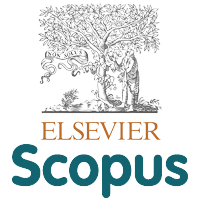Phytochemical Screening and Antioxidant Activity of Selekop (Lepisanthes amoena) Fruit
Abstract
Selekop (Lepisanthes amoena (Hassk.) Leenh.) plant leaves are used by the Dayak tribe of East Kalimantan as traditional cosmetics. Selekop fruit is also edible, but not well known. This study was conducted to obtain the phytochemical content and antioxidant assay in flesh, seed and pericarp extracts from the fruit of Selekop. Phytochemical analysis was conducted on ethanol extract for identification of flavonoid, alkaloid, tannin, saponin, triterpenoid and steroid. The antioxidant activity was done by DPPH assay with ascorbic acid as positive control. The flesh contained flavonoid, saponin, and tannin; the seed contained flavonoid, alkaloid, saponin, triterpenoid, and tannin; and the pericarp contained flavonoid, alkaloid, saponin, triterpenoid, and tannin. Analysis of antioxidant activity revealed the following Inhibitory Concentration (IC50 values): 122.51 ppm of flesh, 63.30 ppm of seed, 53.21 ppm of pericarp and 3.06 ppm of ascorbic acid. Based on these results, the ethanol extract of the seed and the flesh had a phytochemical content and antioxidant activity which was better than the flesh extract from Selekop fuit.
Keywords
Full Text:
PDFReferences
Ahmed, Z. U., Bithi, S. S., Khan, Md. M. R., Hossain, Md. M., Sharmin, S., & Rony, S. R. (2014). Phytochemical screening, antioxidant and cytotoxic activity of fruit extracts of Calamus tenuis Roxb. Journal of Coastal Life Medicine, 2(8), 645-650. crossref
Aksara, R., Musa, W. J. A., & Alio, L. (2013). Identifikasi senyawa alkaloid dari ekstrak metanol kulit batang mangga (Mangifera indica L) [Alkaloid compound identification from methanol extract of the bark of mango (Mangifera indica L)]. Jurnal Entropi, 8(1), 514-519. Retrieved from http://repository.ung.ac.id/get/simlit_res/1/478/Identifikasi-Senyawa-Alkaloid-Dari-Ekstrak-Metanol-Kulit-Batang-Mangga-Mangifera-indica-LPenulis3.pdf PDF
Arung, E. T., Kusuma, I. W., Christy, E. O., Shimizu, K., & Kondo, R. (2009). Evaluation of medicinal plants from Central Kalimantan for antimelanogenesis. Journal of Natural Medicines, 63(4), 473–480. crossref
Bakar, Mohd. F. A., Karim, F. A., & Perisamy, E. (2015). Comparison of phytochemicals and antioxidant properties of different fruit parts of selected Artocarpus species from Sabah, Malaysia. Sains Malaysiana, 44(3), 355-363. Retrieved from http://journalarticle.ukm.my/8477/ website
Carlsen, M. H., Halvorsen, B. L., Holte, K., Bøhn, S. K., Dragland, S., Sampson, L., … Blomhoff, R. (2010). The total antioxidant content of more than 3100 foods, beverages, spices, herbs and supplements used worldwide. Nutrition Journal, 9(3), 1–11. crossref
Contreras-Calderón, J., Calderón-Jaimes, L., Guerra-Hernández, E., & García-Villanova, B. (2011). Antioxidant capacity, phenolic content and vitamin C in pulp, peel and seed from 24 exotic fruits from Colombia. Food Research International, 44(7), 2047–2053. crossref
Fahrunnida, & Pratiwi, R. (2015). Kandungan saponin buah, daun dan tangkai daun belimbing wuluh (Averrhoa bilimbi L.) [The content of saponin in fruits, leaves and petioles of belimbing wuluh (Averrhoa bilimbi L.)]. In Sajidan, C. Muryani, M. G. Rindarjono, P. Karyanto, M. Masykuri, Maridi, .......... Suciati (Eds.), Towards conservation and sustainable use of natural resources: A perspective of education, biology, geography and environmental science. Paper presented at Proceedings of the National Seminar of Conservation and Utilization of Natural Resources, Surakarta, 13 January (pp. 220-224). Surakarta, ID: Faculty of Teacher Training and Education, Universitas Sebelas Maret. Retrieved from http://jurnal.fkip.uns.ac.id/index.php/kpsda/article/view/5378 website
Harborne, J. B. (1987). Metode fitokimia: Penuntun cara modern menganalisis tumbuhan [Phytochemical methods: A guide to modern techniques of plant]. In K. Padmawinata, I. Soediro, & S. Niksolihin (Translators). Bandung, ID: Institute of Technology Bandung.
Jun, M., Fu, H. Y., Hong, J., Wan, X., Yang, C. S., & Ho, C. T. (2003). Comparison of antioxidant activities of isoflavones from kudzu root (Pueraria lobata Ohwi). Journal of Food Science, 68(6), 2117–2122. crossref
Kokate, C. K. (2001). Pharmacognosy (16th ed.). Mumbai, IN: Nirali Prakashan Publ. Malangngi, L., Sangi, M., & Paendong, J. (2012). Penentuan kandungan tanin dan uji aktivitas antioksidan ekstrak biji buah alpukat (Persea americana Mill.) [Determination of tannin content and antioxidant activity test of avocado seed extract (Persea americana Mill.)]. Jurnal MIPA Unsrat Online, 1(1), 5-10. Retrieved from http://ejournal.unsrat.ac.id/index.php/jmuo/article/view/423 website
Manzoor, M., Anwar, F., Mahmood, Z., Rashid, U., & Ashraf, M. (2012). Variation in minerals, phenolics and antioxidant activity of peel and pulp of different varieties of peach (Prunus persica L.) fruit from Pakistan. Molecules, 17(6), 6491-6506. crossref
Milow, P., Malek, S. B., Edo, J., & Ong, H. C. (2014). Malaysian species of plants with edible fruits or seeds and their valuation. International Journal of Fruit Science, 14(1), 1–27. crossref
Novelli, S., Lorena, C., & Antonella, C. (2014). Identification of alkaloid’s profile in Ficus benjamina L. extracts with higher antioxidant power. American Journal of Plant Sciences, 5, 4029–4039. crossref
Waluyo, T. K., & Pasaribu, G. (2013). Aktifitas antioksidan dan antikoagulasi resin jernang [Antioxidant and anticoagulation activities of dragon’s blood]. Jurnal Penelitian Hasil Hutan, 31(4), 306-315. Retrieved from http://ejournal.forda-mof.org/latihan/index.php/JPHH/article/view/92 website
Zhang, Y. J., Gan, R. Y., Li, S., Zhou, Y., Li, A. N., Xu, D. P., & Li, H. B. (2015). Antioxidant phytochemicals for the prevention and treatment of chronic diseases. Molecules, 20(12), 21138–21156. crossref
DOI: http://doi.org/10.17503/agrivita.v39i2.810
Copyright (c) 2017 AGRIVITA, Journal of Agricultural Science

This work is licensed under a Creative Commons Attribution-NonCommercial 4.0 International License.








